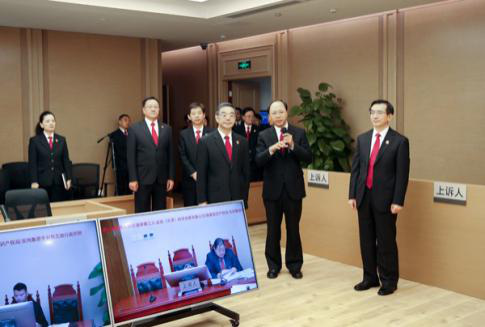Zhou Qiang Stresses Providing Judicial Support for Innovation-driven Development at the Intellectual Property Court of the SPC

Zhou Qiang, president of the Supreme People's Court, listens to a work report at the Intellectual Property Court. [Photo/court.gov.cn]
Zhou Qiang, president of the Supreme People’s Court (SPC), called for strong judicial support and services for the innovation-driven development strategy at a symposium held at the SPC's Intellectual Property Court (IP Court) on Nov 20.
Since its establishment at the beginning of this year, the IP Court, by sticking to the requirements of "high starting point, high standard, high level and internationalization", has made remarkable achievements in unifying trial criteria and improving trial quality and efficiency of IP cases.
Zhou fully affirmed the achievements made by the IP Court and emphasized the importance to thoroughly implement the spirit of the Fourth Plenary Session of the 19th CPC Central Committee, strengthen the judicial protection of IP rights, adhere to serving the overall situation, administrating justice for the people and maintaining judicial fairness, and promote the modernization of the judicial system and judicial capacity under the guidance of Xi Jinping Thought on Socialism with Chinese Characteristics for a New Era.
Zhou visited the technologically advanced court rooms of the IP Court, extended greetings to the judges and other staff, and listened to a work report.
Zhou encouraged the judges and other staff to cherish the opportunity of combining personal dreams with the cause of the CPC and the country, and of creating new achievements in the new era.
Zhou pointed out that the IP Court has achieved a lot to unifying trial criteria, providing strict judicial IP protection, improving trial quality and efficiency, and conducting active court management and vigorous culture building, all of which have provided beneficial experience for further reforms and innovations.
Zhou instructed the IP Court to maximize the functional role of trials and implement the new development concept so as to provide potent judicial services and support for innovation-driven development; to make "the systemic project of unifying trial criteria and improving trial quality and efficiency" a major task, improve the work mechanism and summarize more reproducible and scalable experience; to keep implementing the classic case strategy and fully mobilize judges' wisdom and entrepreneurship to yield a batch of significant landmark adjudications; and to stick to the principle of justice for the people, actively explore litigation procedure reform, develop the alternative dispute resolution mechanism, explore online mediation and online hearings, and improve the circuit trial mechanism, in order to meet people's varying judicial demands.
Zhou also stressed the importance of improving the diversified technical fact finding mechanism and establishing a sharing mechanism for diversified fact finding specialized personnel so as to effectively solve the problems in IP litigation; promoting the application of information technologies such as big data, cloud computing, artificial intelligence and blockchains, etc. in order to make trials more and more intelligent; and actively advancing international judicial communication and cooperation so as to boost the credibility and influence of China's IP protection.
What is more, Zhou emphasized zero tolerance of corruption in the judicial system, and called for the improvement of judges' expertise through constant academic study and professional training.
The symposium was also attended by Luo Dongchuan, vice-president of the Supreme People's Court and chief judge of the IP Court, and Kou Fang, president of the Beijing High People's Court.
